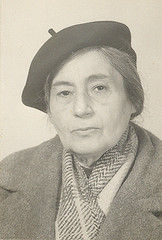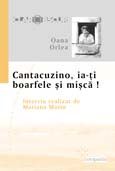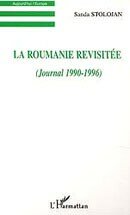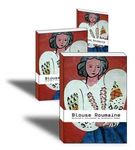Womens voices of Roumania
Below, some incredible extracts taken from a beautifully written book, "Blouse Roumaine" (inspired by a Matisse painting) by Constantin Roman. It is a tribute to the voices of Romanian women, both heard and unheard. You can find the link to this wonderful book on the right of the page. The likes of Ana Pauker and the unpronounceable wife of Ceausescu aren't included, of course. This is a place for those I admire, and not those I abhor. Please read on, and spare these women and their experiences tender thought and much affection. Remember that these are only a few - their voices represent the thousands of other women who also lived through and survived (or sadly not) the same persecution, terror and unimaginable cruelty, during our lifetime. Here. In Romania. The country of my heart. Our neighbour. So nearby....
 Sabina Wurmbrand (Sabina Oster)
Sabina Wurmbrand (Sabina Oster)
Missionary of the underground church, Pastor’s wife, Political Prisoner, Exile, (1913, Romania – 2000, California, USA)
"...I was marched to the guard-room and put into a carcer. It was a narrow cupboard built into the wall in which you could just stand. The iron door had a few holes to admit air... After a few hours, my feet were burning. The blood in my temples beat with slow, painful thuds. How many hours could they keep me here?... Drops of water were falling from somewhere on the roof of the box. It was a desolate sound. I counted them to make time pass... I don’t know how long I did this, but at a certain moment I simply began to cry aloud to avoid despair.
narrow cupboard built into the wall in which you could just stand. The iron door had a few holes to admit air... After a few hours, my feet were burning. The blood in my temples beat with slow, painful thuds. How many hours could they keep me here?... Drops of water were falling from somewhere on the roof of the box. It was a desolate sound. I counted them to make time pass... I don’t know how long I did this, but at a certain moment I simply began to cry aloud to avoid despair.
"One, two, three, four," I cried, and again, "One, two, three, four..." After a time the words became inarticulate. I didn’t know what I said. My mind had moved into rest. It blacked out. Yet my spirit continued to say something to God.” (“The pastor's wife”)
 Ana Novac
Ana Novac
“The Romanian Anne Frank” - Playwright, Holocaust Survivor, Exile, (b. Transylvania, 1929), living in Paris since 1969.
Nationality:
“I was born in 1929 in Transylvania (Romania). One good morning, when I was 11 years old I woke up to be a Hungarian citizen, without having moved to another place, another street, or even without having changed my shirt. At the age of 14 I was deported to Auschwitz, as a Jew. On my release in 1945 I had become again a Romanian citizen. That is why I have the greatest difficulty in establishing my nationality, other than from my identity papers which specified that I was Jewish.” (“Les beaux jours de ma jeunesse”, Ed Gallimard, Paris, 1996)
I woke up to be a Hungarian citizen, without having moved to another place, another street, or even without having changed my shirt. At the age of 14 I was deported to Auschwitz, as a Jew. On my release in 1945 I had become again a Romanian citizen. That is why I have the greatest difficulty in establishing my nationality, other than from my identity papers which specified that I was Jewish.” (“Les beaux jours de ma jeunesse”, Ed Gallimard, Paris, 1996) Survival:
Survival:
“If there is little mystery as to how one was exterminated in the camps, one knows relatively little as to the “conditions of life” on a day-to-day basis. What would be like to be an inmate of that hole, five minutes before he would clap out during a fight for a bed cover, a dish or a spoon…
How one was living in tattered clothes, hungry, weak, but preserving one’s sarcasm and aggression, an unimaginable vitality in civil life.
That raucous laughter! This is perhaps what is missing from the posthumous documents! That grotesque, ferocious and blunt side, which sharpens our misery much more than lamentations or tears. All in all a strange planet, inhabited by strange martyrs (without any vocation of sainthood), with an exorbitant rage for life, controlled by a sole rule of law – the survival.”
(“Les beaux jours de ma jeunesse”, Ed Gallimard, Paris, 1996)
 Monica Lovinescu
Monica Lovinescu
Romanian exile writer and broadcaster, anti-Communist fighter, (b. 1923, Romania) living in Paris
Ceausescu’s brand of Communism:
“When Ceausescu delivered his speech against the invasion of of Czechoslovakia (by the  Russians) he accredited the myth of the popular support he enjoyed. His acclaim by the crowds gathered in Palace Square in August 1968 lay at the basis of a suicidal complicity between the hangman and his victim. It is through this very act that we secured for ourselves our ‘originality’ within the communist context. The antagonism between “Them” and “Us”, which
Russians) he accredited the myth of the popular support he enjoyed. His acclaim by the crowds gathered in Palace Square in August 1968 lay at the basis of a suicidal complicity between the hangman and his victim. It is through this very act that we secured for ourselves our ‘originality’ within the communist context. The antagonism between “Them” and “Us”, which  characterized the regime of Gheorghiu-Dej without as such circumventing its tragic dimension, dissolved in the derisive. On that tragic Shakespearean stage all characters of prime stature had disappeared leaving behind only the bafoons, whose whose ribaldry were empty of meaning..”
characterized the regime of Gheorghiu-Dej without as such circumventing its tragic dimension, dissolved in the derisive. On that tragic Shakespearean stage all characters of prime stature had disappeared leaving behind only the bafoons, whose whose ribaldry were empty of meaning..”
(“La apa Vavilonului 1960-1980”, Vol 2, Ed Humanitas, Bucharest, 2001)
Destruction of Romanian Élites:
“In Romania, the dissidence was an exception. Our rezistance was present when it did not exist in the other satellite countries and it ended just as it started with our neighbouring countries. We fought and died in the Carpathian mountains as the West was blind and deaf, soaking in its victory and forgetting its hostages. From the prisons where our Élite was destroyed came out in the 1960’s only the shadows of our earlier determination. Three succecive waves of terror – 1948, 1952 and 1958 had drained the collective organism. We caved ina quasy total silence. We sacrificed ourselves for nothing. With this sense of utter uselessness emerged from jails most of the survivors, some of whom, whilst “free”, remained at the beck and call of the Securitate.”
(“La apa Vavilonului 1960-1980”, Vol 2, Ed Humanitas, Bucharest, 2001) Madelene "Madi" Cancicov
Madelene "Madi" Cancicov
Lawyer, Political Prisoner, Writer, Exile
(25 June 1904, Bucharest – 6 June 1985, London)
Good and Evil :
“Evil is perhaps none other than the lack of courage to do Good. Because, as you can see, the Good is an uphill struggle, but Evil is a sliding slope.
What is extraordinary, tragic and dangerous in the realm of good faith is that one cannot suspect the existence of bad faith. “
“Le cachot des marionettes”
Judges:
“ Judges are prodigal because their life is not at stake”.
“Le cachot des marionettes” Reminiscences:
Reminiscences:
“Dear puppets on a string, I will have to bade you farewell (…) I have passed to you my poisoned chalice. You did not die of it but instead I could live.. I often asked myself: why do it? I could never remember it all and moreover I will never have the opportunity of putting it on paper. However I persevered so that such years of my life would not be completely wasted”
“Le cachot des marionettes”
Solitude:
“And the solitude: do you know what it means to forfeit one’s solitude?
“Le cachot des marionettes”
 Oana Orlea
Oana Orlea
née Oana Cantacuzino, Exile living in France, Political Prisoner, Writer, Exile, (b. 1936, Romania)
Prison Peep-hole:
“The eye of an evil God who hides his face and has absolute power over the prisoner.” (“Les Anées volées – dans le Goulag roumain a seize ans”, Seuil, 1991)
Resistance:
“The resistance in the (Carpathian) mountains was a dramatic episode. I realise that I do not know what name to give it, by what name to identify these men and women who died up there under  the bullets, or simply of cold and hunger. Such appellations were found (for others): The resistance is French,” as it fights the Germans, the partisans are Soviet, as they fight the Germans. There are also the desperados and the mudjahidins, but there is no word assigned to those who had fought, arm in hand, against the Communists, in the countries of Eastern Europe, occupied by the Soviet armies.” (“Les Années volées – dans le Goulag roumain a seize ans”, Seuil, 1991)
the bullets, or simply of cold and hunger. Such appellations were found (for others): The resistance is French,” as it fights the Germans, the partisans are Soviet, as they fight the Germans. There are also the desperados and the mudjahidins, but there is no word assigned to those who had fought, arm in hand, against the Communists, in the countries of Eastern Europe, occupied by the Soviet armies.” (“Les Années volées – dans le Goulag roumain a seize ans”, Seuil, 1991)
Russians:
“The passion of the Russians for wrist watches was a classic: it was funny to see them display several watches to their wrist, or an alarm clock hanging round their neck.” (“Les Années volées”, Seuil, 1991)
Soviet female army officers:
“As to the females of the Soviet army, they discovered in Romania the existence of such underwear as the chemisette and the bra, which they were so proud of, that they would wear it over their uniform, but nobody had the guts to laugh at such things. When the first Romanian refugees who reached the West, brought with them such images, they were accused of being CIA agents.” (“Les Années volées”, Seuil, 1991)
 Marta Petreu
Marta Petreu
Poet, Philosopher, Essayist, Academic
Living in Cluj, (b. 14th March 1955)
Eugene Ionesco in Romania:
“He was cured as one would be, through a classic psycho-analytic therapy, by writing (like a writer would do, with all the pre-requisite exaggerations and not like a historian, with all its scientific precision), by stating the truth: this truth, which we no longer like.” (“Eugeen Ionesco in his paternal country”)
Legionary Movement:
“The Legionary Movement is our national product, the revolt of our nasty and vindictive  collective subconsciousness”… “ I believe that the source of some of the excesses during the Communist period is to be found in the inter-war period and in its excesses. Likewise, I believe that the reason of so many failiures during the past ten years – corruption, politicking, improbable justice, undemocratic behaviour is to be found in our history since 1918.” (“"Adevarului literar si artistic" (Nr. 547/ 05.12. 2000)”)
collective subconsciousness”… “ I believe that the source of some of the excesses during the Communist period is to be found in the inter-war period and in its excesses. Likewise, I believe that the reason of so many failiures during the past ten years – corruption, politicking, improbable justice, undemocratic behaviour is to be found in our history since 1918.” (“"Adevarului literar si artistic" (Nr. 547/ 05.12. 2000)”)
Biography:
Marta Petreu is professor at Cluj University, a poet, essayist and a Philosopher and at the same time Editor-in-Chief of the magazine “Apostrof”, a platform from which she directs her criticism at the right-wing extremist nationalism in Romania. It is to be noted that the very mayor of Cluj, as a proponent of extreme nationalism is a graphic representation of professor Petreu’s attention. The interest is reciprocal with the difference that instead of using the same means of criticism through publishing professor Petreu’s opponents indulge in tactics of the more basic  variety, involving threats of physical violence. As a result, both Marta Petreu and her publication remain rather isolated in a climate where it had become increasingly difficult to speak one’s mind.
variety, involving threats of physical violence. As a result, both Marta Petreu and her publication remain rather isolated in a climate where it had become increasingly difficult to speak one’s mind.
Under Ceausescu’s regime Marta Petreu would have ended in a lunatic asylum or in the kind of isolated prison camp described by Oana Orlea, Madeleine Cancicov, Annie Samuelli, Sabina Wurmbrand (q.v.) and thousands of women tortured like them under the Communist dictatorship. Instead, in the post-Communist transition period such treatment is confined rather to intimidation and regular death threats. This is clearly quite an achievement considering the starting point on the road to NATO and to the European Union, that Romania wants to join. It is little wonder that she is expected to align and apply it laws in compliance to accepted civilised standards, before entry to such Clubs may be achieved. It maybe that Marta Petreu’s treatment, and that of other people llike her, may be a test case.
In 2002 the Writer’s Union of Cluj nominated Marta Petreu for the 2001 Henri Jacquier Prize given by the Institut Francais for her book “Eugene Ionesco in his paternal country”. Earlier, in June 2001, in New York , Marta Petreu was given by the Human Rights Watch the presitigious Hellman-Hemmett Prize, as one amongst 27 world authors who suffered persecution in their own country.
One could say, without fear of contradiction that for her courage and obduracy, combined with an incisive analytical mind and high moral values Marta Petreu falls in a very special category of exceptional women.
 Elisabeta Rizea of Nucsoara
Elisabeta Rizea of Nucsoara
Peasant Farmer, Resistance Fighter, (b. ca 1912, Romania) living in the village of Nucsoara, Co Arges
Communists:
“When these wretched communists came to power they took everything from us, the land, the wooden carts, -the hair off our heads – still, what they could not take was our soul.” (interview given on 20th May 2001, on the occasion of the private visit to her home of King Michael)
Biography:
Elisabeta Rizea was born before the WWI, in a small village of the  Southern Carpathians, in County Arges. She was a peasant farmer with a minute plot of land, a modest wooden cottage, covered in shingles and a few animals. Her every day dress was the national garb, embroidered with intricate patterns. She left school at the age of 14 to do what was expected of her lot - to help make a meagre existence off her small allotment. Her fierce opposition to the Communist expropriation and her husband joining the guerrilla fighters in the mountains led to torture and long years of imprisonment. She was branded “an enemy of the people” (“dusman al poporului”) and her household labelled “a home of bandits” (“casa de banditi”) – the worst possible indictment in the Communist state. Once in jail, in the notorious Pitesti prison, Elisabeta Rizea was held in chains and put on death row. She outlived her death sentence to tell her story, after Ceausescu’s fall.
Southern Carpathians, in County Arges. She was a peasant farmer with a minute plot of land, a modest wooden cottage, covered in shingles and a few animals. Her every day dress was the national garb, embroidered with intricate patterns. She left school at the age of 14 to do what was expected of her lot - to help make a meagre existence off her small allotment. Her fierce opposition to the Communist expropriation and her husband joining the guerrilla fighters in the mountains led to torture and long years of imprisonment. She was branded “an enemy of the people” (“dusman al poporului”) and her household labelled “a home of bandits” (“casa de banditi”) – the worst possible indictment in the Communist state. Once in jail, in the notorious Pitesti prison, Elisabeta Rizea was held in chains and put on death row. She outlived her death sentence to tell her story, after Ceausescu’s fall.
 Sanda Stolojan
Sanda Stolojan
Novelist, Translator, Poet, Personal Interpreter of the President of France,  Human Rights activist, Exile living in Paris
Human Rights activist, Exile living in Paris
Romanian Spirit:
“There is a certain quality in being detached, a merit in renouncing the worldly, which include also the territory of the Spirit. In order to find the Romanian Spirit one has to travel far into the desert, where it took refuge a long time ago, when confronted to the devastating violence of History. In the desert, in the void of scepticism, which wiped the table clean, it seems that it is there the remarkable Romanian Spirit. At this stage it seems that it may have something to tell, a superior message, but what it has to tell is of little interest to matters of History. One may percieve even grandeur and distinction in this Spirit which refuses to adhere to the world, even a certain superiority in this refusal. But who ever cares about refusal, about the non-resistence to the crime which now, more so than ever, is at the heart of History,? What may be the use of renouncing action? Maybe writing aphorisms like Cioran, meditating about the furility of action…… Finally, whatever may be its loftiness, compared to the values of the Spiri,t I still suspect there is something illicit in the smile of the Wise…” (“Au balcon de l’exil Roumain a Paris”, Ed L’Harmattan, Paris, 1999)
 Biography:
Biography:
Sanda Stolojan (b. 1919) belongs to a family of Romanian scholars and diplomats. Her experience of western European languages and cultures dates to her childhood. She spent time at the Uranus Military prison in Bucharest. Her husband spent many years in prison, and at the infamous slave labour camp at the Danube-black Sea canal. These experiences caused an interruption in Sanda Stolojan's literary career. In the early 1960s, the bankrupt communist economy in need of cash, Sanda Stolojan and her husband were bought by a relation in France, for 25,000, dollars and were allowed to leave Romania for the West. Sanda Stolojan became a Romanian interpreter for the French Presidency for thirty years, from De Gaulle to Jacques Chirac. This privileged position allowed her to return to Romania as part of the official French delegations. In France she was one of the leaders of the anti-Communist exile group who sought to restore Romanian dignity in the face of Communist secret service agression. This milieu is presented in her recent memoirs published in Paris and Bucharest. Sanda Stolojan is a former president of 'The League for Human Rights in Romania' (1984-1990).
HERE'S the site again. Please do go and check it out.
and if they make you want to dash to your local bookshop, try these, too:
Annie Samuelli
 In 1949, Annie Samuelli and her sister Nora were seized by the Communists on trumped-up charges in a mass arrest of all Romanian nationals working for the U.S. and British Legations in Bucharest. After nine months of torture and interrogation, the two sisters were sentenced to long prison terms. Then, in 1961, after 11 years and 340 days in separate prisons and security cells, the two were quietly released from jail and exiled upon payment of ransom by a relative living in the United States. In this book, Annie Samuelli writes of those years of imprisonment with great sensitivity and a remarkable lack of bitterness. She describes her successful effort to sustain her own and others' spirits through the seemingly endless ordeal. This is an authentic, graphic record of one woman's odyssey in the shadow world of the Iron Curtain prisons. Reprint of 'The Wall Between'.
In 1949, Annie Samuelli and her sister Nora were seized by the Communists on trumped-up charges in a mass arrest of all Romanian nationals working for the U.S. and British Legations in Bucharest. After nine months of torture and interrogation, the two sisters were sentenced to long prison terms. Then, in 1961, after 11 years and 340 days in separate prisons and security cells, the two were quietly released from jail and exiled upon payment of ransom by a relative living in the United States. In this book, Annie Samuelli writes of those years of imprisonment with great sensitivity and a remarkable lack of bitterness. She describes her successful effort to sustain her own and others' spirits through the seemingly endless ordeal. This is an authentic, graphic record of one woman's odyssey in the shadow world of the Iron Curtain prisons. Reprint of 'The Wall Between'.
Lena Constante
 "I have lived, alone, in a cell, 157,852,800 seconds of solitude and fear. Cause for screaming! They sentence me to live yet another 220,838,400 seconds! To live them or to die from them."–from The Silent Escape
"I have lived, alone, in a cell, 157,852,800 seconds of solitude and fear. Cause for screaming! They sentence me to live yet another 220,838,400 seconds! To live them or to die from them."–from The Silent Escape
Victim of Stalinist-era terror, Lena Constante was arrested on trumped-up charges of "espionage" and sentenced to twelve years in Romanian prisons. The Silent Escape is the extraordinary account of the first eight years of her incarceration–years of solitary confinement during which she was tortured, starved, and daily humiliated.
The only woman to have endured isolation so long in Romanian jails, Constante is also one of the few women political prisoners to have written about her ordeal. Unlike other more political prison diaries, this book draws us into the practical and emotional experiences of everyday prison life. Candidly, eloquently, Constante describes the physical and psychological abuses that were the common lot of communist-state political prisoners. She also recounts the particular humiliations she suffered as a woman, including that of male guards watching her in the bathroom. Constante survived by escaping into her mind–and finally by discovering the "language of the walls," which enabled her to communicate with other female inmates. A powerful story of totalitarianism and human endurance, this work makes an important contribution to the literature of "prison notebooks."

/https%3A%2F%2Fstorage.canalblog.com%2F03%2F12%2F353913%2F41915630_o.jpg)
/https%3A%2F%2Fstorage.canalblog.com%2F15%2F06%2F353913%2F41915331_o.jpg)
/https%3A%2F%2Fstorage.canalblog.com%2F03%2F68%2F353913%2F41914713_o.jpg)
/https%3A%2F%2Fstorage.canalblog.com%2F22%2F12%2F353913%2F29890995_o.jpg)
/https%3A%2F%2Fstorage.canalblog.com%2F68%2F41%2F353913%2F29890862_o.jpg)



/https%3A%2F%2Fstorage.canalblog.com%2F08%2F12%2F353913%2F116988178_o.jpg)
/https%3A%2F%2Fstorage.canalblog.com%2F59%2F38%2F353913%2F115811794_o.jpg)
/https%3A%2F%2Fstorage.canalblog.com%2F00%2F54%2F353913%2F113969303_o.jpg)
/http%3A%2F%2Fp8.storage.canalblog.com%2F81%2F17%2F353913%2F59684501_p.jpg)